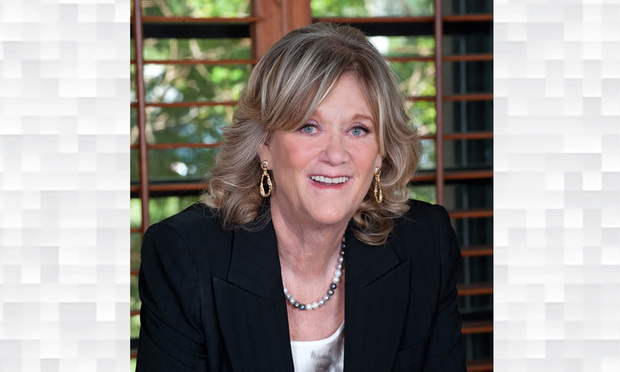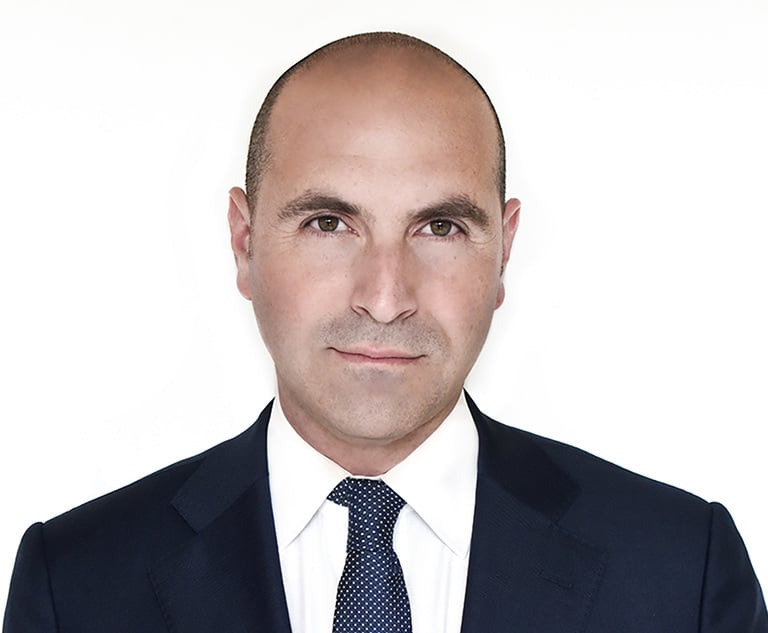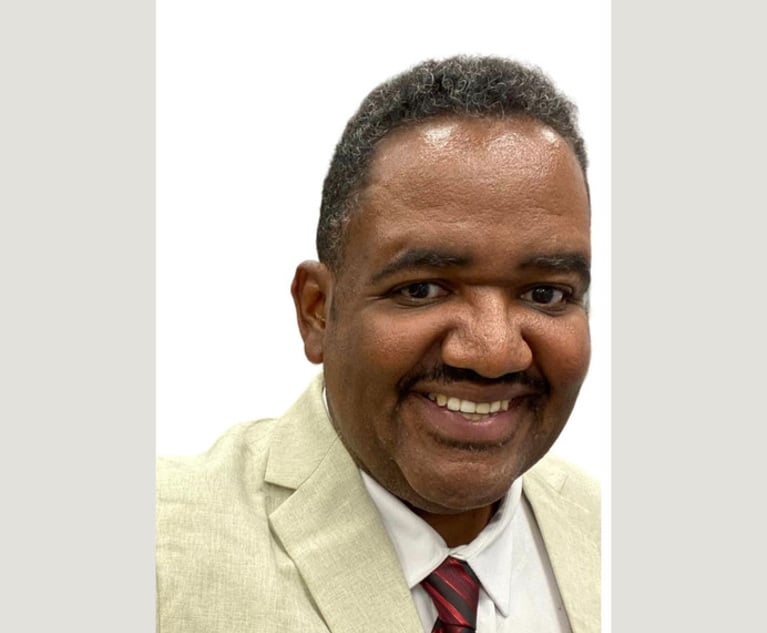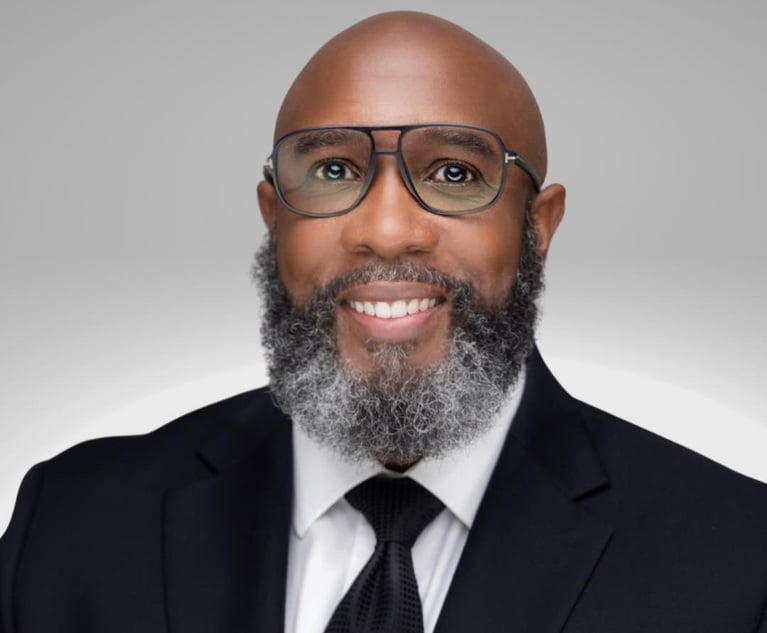'Star Trek' and Separations: Attorney Cynthia Greene's Bold Journey Into Family Law
Behold the voyages of noted Miami Beach attorney Cynthia Greene. Her lifelong mission: to explore strange new worlds, to seek out new solutions in family disputes, and boldly go where no appellate lawyer has gone before.
September 21, 2018 at 12:49 PM
6 minute read
 Cynthia Greene of Young, Berman, Karpf & Gonzalez. Courtesy photo.
Cynthia Greene of Young, Berman, Karpf & Gonzalez. Courtesy photo.
Law. The final frontier.
Cynthia L. Greene, incoming counsel to Young, Berman, Karpf & Gonzalez in Miami, has spent almost 40 years carving a name for herself in the antagonistic world of appellate marital and family law, but she'd rather see the world through “Star Trek” goggles.
“I like the message that in the future there will be no more countries. Everybody will be of a planet,” she said. “In other words, we're not going to be Americans or Russians or British. We're going to be from Earth, and all other planets that rise to that level are then part of an organization that protects one another. I think it's a really great view of the future that I hope that we will get to at some point in the long history of our being.”
Greene looks forward to the day when family life is less fraught with division because, in many of her cases, ”the parties simply do not know how to communicate with each other,” either because of anger or disappointment.
“Sometimes you see clients and you realize that these two people have not a clue how to speak to each other, or even a clue about what matters to one and not the other,” Greene said. “It takes genuine care and concern on both sides to stay together. It's not easy. Many people can do it, and many people can't do it.”
At home, she tries to lead by example.
“I have cats that aren't afraid of dogs. I have dogs that lick the cats and don't chase them,” Greene said. “See, the world can be perfect.”
The dogs, Geordi La Forge, Chief Tasha Yar and Lieutenant Reginald Endicott Barclay III, are named after Star Trek characters, and have become Geordi, Tasha and Reggie for practical reasons.
 Star Trek Enterprise. Photo: Courtesy of The Smithsonian
Star Trek Enterprise. Photo: Courtesy of The SmithsonianNaturally, Star Trek conventions are a priority. And yes, “of course” she dresses up.
Her favorite costume? A white, full-length dress featured in “Star Trek Next Generation” — the movie, not the show.
“It's a really good-looking uniform,” Greene said.
Greene grew up in Miami Beach when it was “more like a small town,” where “pretty much everybody knew everybody and you couldn't get yourself into too much trouble because your mother would be called pretty fast.”
They were the baby boom days, Greene recalled.
“It was a community of men just back from the war, getting married, wanting to raise families and buying houses,” she said.
But fast-forward to present day, and Greene navigates divorce, child custody, property division, paternity and post-nuptial agreements at trial and appellate court levels.
Sometimes, Greene admits, “there's nothing a lawyer can do” when a family breaks down.
'I really don't mind getting yelled at'
What fires Greene's engines in the professional realm is interpreting the ever-evolving nuts, bolts and nuances of appellate law.
“The law and the field is being made every day out of the appellate courts. And you really have to stay current, you really have to know it and I like the challenge of that,” she said.
Appellate lawyers, in particular, need to know how to “make somebody who has to read 50, 100 briefs a week to want to read yours,” Greene said.
The trick? “Get a really dynamic opening sentence,” Greene said.
According to Greene, curiosity has always made her a good writer.
“So I'm either going to be writing biographies or I'm going to be a lawyer,” she said. “Since I can't compete with Doris Kearns Goodwin, I went to law school.”
At law school, she found the “best possible trainer” in Melvyn Frumkes, a renowned figure in the family law field.
Frumkes “could yell,” but she was OK with that.
“I really don't mind getting yelled at,” Greene said. “I would have been a very good marine, I guess.”
According to Greene, working with Frumkes for 10 years after graduating taught her to be creative and detail-oriented.
“He was brilliant and you had to live up to his standards. If he said find a case that said 'X,' you had to bring him a case that said 'X.' You couldn't go in with 'W' or 'V.' If it took you all night and you didn't sleep before you found 'X,' too bad,” Greene said.
'Wow, what a lawyer'
Mitch Karpf of Young Berman recalled the first time he met Greene, when she represented the deputy director of the CIA in divorce proceedings.
“I had heard of Cynthia Greene, and there she is in the courtroom,” Karpf said. “I'm watching her and as I'm doing my examination she's doodling the whole time. And I think to myself, 'Well, this is going to be good because she's not paying attention.' Then when I finish, she puts her pencil down and she went through the most masterful cross-examination I had ever seen. And at that point I thought, 'Wow, what a lawyer.' ”
In her new post at the firm, Greene will likely keep doing what she's always done: “ Never stop learning,” she said.
“They give you a diploma, they tell you you're a lawyer, but you can't stop learning,” Greene said. “If you're in a specialty, there are books, articles and cases that come out every day. You have to read them all. You have to stay current and you can't ride on what you read a month ago or two weeks ago. That's I think how people become and stay good lawyers, in any specialty.”
Cynthia L. Greene
Born: October 1950, Miami Beach
Education: University of Miami School of Law, J.D.,1979; University of Miami, B.A., 1975
Experience: Of counsel, Young, Berman, Karpf & Gonzalez, 2018-present; General counsel and vice president for public policy and government affairs, Broward College, 2011-present; Greene, Smith & Associates, 2004-2017; Cynthia L. Greene, 1996-1999; Partner, Elser, Greene & Hodor, 1992-1996; Chairwoman, Family Law Section of the Florida Bar 1989-1990; Cynthia L. Greene & Associates, 1989-1992; Partner, Frumkes & Greene, 1983-1988; Associate, Melvyn B. Frumkes, 1979-1983
Related stories:
When Your Business Partner's Divorce Seems Like Your Own
The Florida Supreme Court Expands Rights of Biological Parents
This content has been archived. It is available through our partners, LexisNexis® and Bloomberg Law.
To view this content, please continue to their sites.
Not a Lexis Subscriber?
Subscribe Now
Not a Bloomberg Law Subscriber?
Subscribe Now
NOT FOR REPRINT
© 2025 ALM Global, LLC, All Rights Reserved. Request academic re-use from www.copyright.com. All other uses, submit a request to [email protected]. For more information visit Asset & Logo Licensing.
You Might Like
View All
Growing Referral Network, Alternative Fees Have This Ex-Big Law’s Atty’s Bankruptcy Practice Soaring
5 minute read
Against the Odds: Voters Elect Woody Clermont to the Broward Judicial Bench
4 minute read
Miami Civil Judge Myriam Lehr to Say Goodbye to the County Court Bench
4 minute readTrending Stories
- 1Charlie Javice Fraud Trial Delayed as Judge Denies Motion to Sever
- 2Holland & Knight Hires Former Davis Wright Tremaine Managing Partner in Seattle
- 3With DEI Rollbacks, Employment Attorneys See Potential for Targeting Corporate Commitment to Equality
- 4Trump Signs Executive Order Creating Strategic Digital Asset Reserve
- 5St. Jude Labs Sued for $14.3M for Allegedly Falling Short of Purchase Expectations
Who Got The Work
J. Brugh Lower of Gibbons has entered an appearance for industrial equipment supplier Devco Corporation in a pending trademark infringement lawsuit. The suit, accusing the defendant of selling knock-off Graco products, was filed Dec. 18 in New Jersey District Court by Rivkin Radler on behalf of Graco Inc. and Graco Minnesota. The case, assigned to U.S. District Judge Zahid N. Quraishi, is 3:24-cv-11294, Graco Inc. et al v. Devco Corporation.
Who Got The Work
Rebecca Maller-Stein and Kent A. Yalowitz of Arnold & Porter Kaye Scholer have entered their appearances for Hanaco Venture Capital and its executives, Lior Prosor and David Frankel, in a pending securities lawsuit. The action, filed on Dec. 24 in New York Southern District Court by Zell, Aron & Co. on behalf of Goldeneye Advisors, accuses the defendants of negligently and fraudulently managing the plaintiff's $1 million investment. The case, assigned to U.S. District Judge Vernon S. Broderick, is 1:24-cv-09918, Goldeneye Advisors, LLC v. Hanaco Venture Capital, Ltd. et al.
Who Got The Work
Attorneys from A&O Shearman has stepped in as defense counsel for Toronto-Dominion Bank and other defendants in a pending securities class action. The suit, filed Dec. 11 in New York Southern District Court by Bleichmar Fonti & Auld, accuses the defendants of concealing the bank's 'pervasive' deficiencies in regards to its compliance with the Bank Secrecy Act and the quality of its anti-money laundering controls. The case, assigned to U.S. District Judge Arun Subramanian, is 1:24-cv-09445, Gonzalez v. The Toronto-Dominion Bank et al.
Who Got The Work
Crown Castle International, a Pennsylvania company providing shared communications infrastructure, has turned to Luke D. Wolf of Gordon Rees Scully Mansukhani to fend off a pending breach-of-contract lawsuit. The court action, filed Nov. 25 in Michigan Eastern District Court by Hooper Hathaway PC on behalf of The Town Residences LLC, accuses Crown Castle of failing to transfer approximately $30,000 in utility payments from T-Mobile in breach of a roof-top lease and assignment agreement. The case, assigned to U.S. District Judge Susan K. Declercq, is 2:24-cv-13131, The Town Residences LLC v. T-Mobile US, Inc. et al.
Who Got The Work
Wilfred P. Coronato and Daniel M. Schwartz of McCarter & English have stepped in as defense counsel to Electrolux Home Products Inc. in a pending product liability lawsuit. The court action, filed Nov. 26 in New York Eastern District Court by Poulos Lopiccolo PC and Nagel Rice LLP on behalf of David Stern, alleges that the defendant's refrigerators’ drawers and shelving repeatedly break and fall apart within months after purchase. The case, assigned to U.S. District Judge Joan M. Azrack, is 2:24-cv-08204, Stern v. Electrolux Home Products, Inc.
Featured Firms
Law Offices of Gary Martin Hays & Associates, P.C.
(470) 294-1674
Law Offices of Mark E. Salomone
(857) 444-6468
Smith & Hassler
(713) 739-1250







